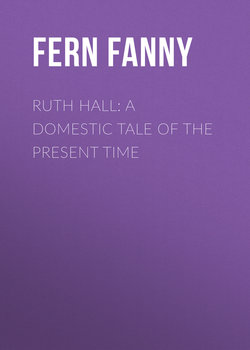Читать книгу Ruth Hall: A Domestic Tale of the Present Time - Fern Fanny - Страница 7
CHAPTER VI
ОглавлениеHarry’s father began life on a farm in Vermont. Between handling ploughs, hoes, and harrows, he had managed to pick up sufficient knowledge to establish himself as a country doctor; well contented to ride six miles on horseback of a stormy night, to extract a tooth for some distracted wretch, for twenty-five cents. Naturally loquacious, and equally fond of administering jalap and gossip, he soon became a great favorite with the “women folks,” which every aspiring Esculapius, who reads this, knows to be half the battle. They soon began to trust him, not only in drawing teeth, but in cases involving the increase of the village census. Several successes in this line, which he took no pains to conceal, put him behind a gig of his own, and enabled his practice to overtake his fame as far as the next village.
Like many other persons, who revolve all their life in a peck measure, the doctor’s views of the world in general, and its denizens in particular, were somewhat circumscribed. Added to this, he was as persevering as a fly in the dog-days, and as immovable as the old rusty weather-cock on the village meeting-house, which for twenty years had never been blown about by any whisking wind of doctrine. “When he opened his mouth, no dog must bark;” and any dissent from his opinion, however circumspectly worded, he considered a personal insult. As his wife entertained the same liberal views, occasional conjugal collisions, on this narrow track, were the consequence; the interest of which was intensified by each reminding the other of their Calvinistic church obligations to keep the peace. They had, however, one common ground of undisputed territory – their “Son Harry,” who was as infallible as the Pope, and (until he got married) never did a foolish thing since he was born. On this last point, their “Son Harry” did not exactly agree with them, as he considered it decidedly the most delightful negotiation he had ever made, and one which he could not even think of without a sudden acceleration of pulse.
Time wore on, the young couple occupying their own suite of apartments, while the old people kept house. The doctor, who had saved enough to lay his saddle-bags with his medical books on the shelf, busied himself, after he had been to market in the morning, in speculating on what Ruth was about, or in peeping over the balustrade, to see who called when the bell rang; or, in counting the wood-pile, to see how many sticks the cook had taken to make the pot boil for dinner. The second girl (a supernumerary of the bridal week) had long since been dismissed; and the doctor and his wife spent their evenings with the cook, to save the expense of burning an extra lamp. Consequently, Betty soon began to consider herself one of the family, and surprised Ruth one day by modestly requesting the loan of her bridal veil “to wear to a little party;” not to speak of sundry naps to which she treated herself in Ruth’s absence, in her damask rocking chair, which was redolent, for some time after, of a strong odor of dish-water.
Still, Ruth kept her wise little mouth shut; moving, amid these discordant elements, as if she were deaf, dumb, and blind.
Oh, love! that thy silken reins could so curb the spirit and bridle the tongue, that thy uplifted finger of warning could calm that bounding pulse, still that throbbing heart, and send those rebellious tears, unnoticed, back to their source.
Ah! could we lay bare the secret history of many a wife’s heart, what martyrs would be found, over whose uncomplaining lips the grave sets its unbroken seal of silence.
But was Harry blind and deaf? Had the bridegroom of a few months grown careless and unobservant? Was he, to whom every hair of that sunny head was dear, blind to the inward struggles, marked only by fits of feverish gaiety? Did he never see the sudden ruse to hide the tell-tale blush, or starting tear? Did it escape his notice, that Ruth would start, like a guilty thing, if a sudden impulse of tenderness betrayed her into laying her hand upon his forehead, or leaning her head upon his shoulder, or throwing her arms about his neck, when the jealous mother was by? Did not his soul bend the silent knee of homage to that youthful self-control that could repress its own warm emotions, and stifle its own sorrows, lest he should know a heart-pang?
Yes; Ruth read it in the magnetic glance of the loving eye as it lingeringly rested on her, and in the low, thrilling tone of the whispered, “God bless you, my wife;” and many an hour, when alone in his counting room, was Harry, forgetful of business, revolving plans for a separate home for himself and Ruth.
This was rendered every day more necessary, by the increased encroachments of the old people, who insisted that no visitors should remain in the house after the old-fashioned hour of nine; at which time the fire should be taken apart, the chairs set up, the lights extinguished, and a solemn silence brood until the next morning’s cock-crowing. It was also suggested to the young couple, that the wear and tear of the front entry carpet might be saved by their entering the house by the back gate, instead of the front door.
Meals were very solemn occasions; the old people frowning, at such times, on all attempts at conversation, save when the doctor narrated the market prices he paid for each article of food upon the table. And so time wore on. The old couple, like two scathed trees, dry, harsh, and uninviting, presenting only rough surfaces to the clinging ivy, which fain would clothe with brightest verdure their leafless branches.
